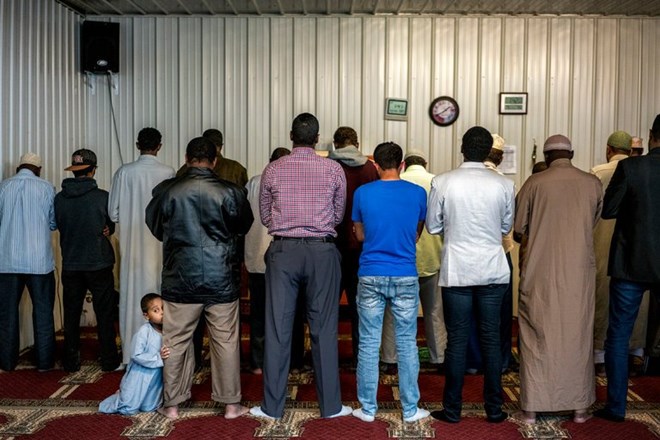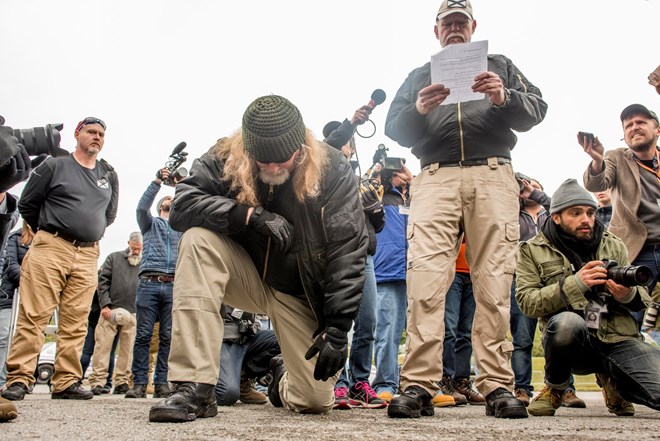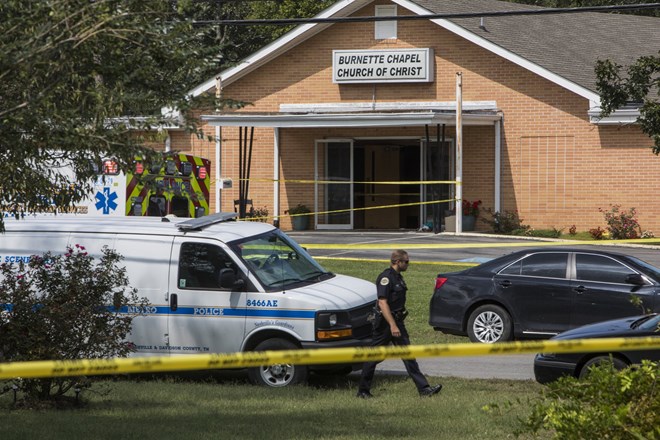
Friday November 3, 2017
By CAMPBELL ROBERTSON
Worshipers at last week’s Friday prayer services at a Shelbyville, Tenn., mosque ahead of a White Lives Matter rally. Credit Johnny Milano for The New York Times
SHELBYVILLE, Tenn. — The themes of the sermon were hope and fear, and nothing testified to the latter like all the empty carpet.
On a typical Friday afternoon, the small, deliberately unmarked mosque on the road out of Shelbyville would be crowded with rows and rows of Somali men, praying between their shifts at the poultry plant.
Last Friday, by the time prayers began, there were only around a dozen.
A man at the poultry plant had offered advice to his Somali co-workers the previous day: get your groceries, do your laundry, run your errands now. Then do not go outside again until Sunday night.
A coterie of white nationalists — Southern secessionists, neo-Nazis, various other strains — were headed to town for a “White Lives Matter” rally. It would be the latest in a string of demonstrations since the spring: in New Orleans, Pikeville, Ky., and Charlottesville, Va.
The advertised purposes of the rally were to protest the presence of refugees, many of them Muslim, in Middle Tennessee, and to hold up as an omen for the future the shooting in September of eight white people at a church in Nashville by a Sudanese-born man. They considered themselves defenders of the faith.
Friday: Dread at the Mosque
At first, the local men said, only a few in the Somali community had known about the rally. Now everyone had heard about it, that it was the kind of protest where, in the Somali phrasing, “they talk with their fists.”
There is not a permanent imam in Shelbyville so Sheikh Abdulrahman Yusuf, imam of a large Somali mosque in Nashville, about an hour to the north, had come down to lead Friday prayers. He had lived in Shelbyville himself 15 years ago, drawn shortly after his arrival in the United States by reports from other refugees about good jobs killing chickens.
A decade or so ago, amid a recession and with hundreds of refugees moving in, there was friction, at the schools and at hiring offices. Lawmakers pushed a flurry of anti-refugee legislation, aimed at Muslims in particular. A mosque in nearby Columbia was burned to the ground.
There are now “Hiring” signs all around Shelbyville, and the number of Somalis at the plant and in the town is considerably smaller than it was. People around here are mostly friendly. Mostly. Just last week a man in Nashville yelled slurs at two Somali sisters and attacked their father with a knife.
Mohamed-Shukri Hassan, 31, who had come from Nashville with the imam on Friday afternoon, listened to the men’s preparations here: “It’s like a hurricane is about to hit,” he said.
After prayers, the imam explained how to contact the authorities in case of harassment, how to balance being a trusting neighbor with being vigilant, and how to use a smartphone camera to capture the identity of an attacker.
The local men chatted before heading home, where they planned to stay, uneasy behind their own front doors, for the next two days.

Members of the League of the South praying during a “White Lives Matter” rally in Shelbyville. Credit Johnny Milano for The New York Times
Saturday: “Terror to Your Enemies, O Lord”
“Consecrate my sword and strengthen the arm that wields it,” began the prayer of Michael Hill, the founder of the League of the South. The rally was, belatedly, set to begin.
“Render me a willing implement of justice and mercy to my people and one of terror to your enemies, O Lord,” he continued, as men and women in Confederate flag capes, Wehrmacht helmets and eye goggles, SS-insignia collar pins and black Make America Great Again caps, knelt or stood silently in the parking lot behind city hall.
“Give us the victory for your honor and glory’s sake. In the name of Christ Jesus our savior we pray, amen!”
And with a cry of “Amen!” the 150 or so white nationalists began to march.
The morning passed in an hour and a half of shouting across a wide street in downtown Shelbyville: the white nationalists orating on white victimhood behind metal barriers in front of Barb’s Corner Café; the much larger and louder opposition drowning them out with old pop songs, laughing taunts and a recording of the Rev. Dr. Martin Luther King Jr.’s “I Have a Dream” speech.
An afternoon demonstration in Murfreesboro was abruptly canceled, which was news to the hundreds of boisterous counterprotesters waiting there. Instead, the white nationalists gathered for an unpublicized picnic, eating homemade ham sandwiches under an overcast sky at Henry Horton State Park.
There were guest speakers: the parents of Jacob S. Goodwin, currently in jail on charges stemming from the beating of a black man at the rally in Charlottesville (the black man, DeAndre Harris, was himself later charged). The father read a letter written by his son in jail, and the mother, wearing a jacket with the insignia of a white nationalist coalition, thanked the crowd for its support, concluding with a cry of “Hail Victory!” A thicket of arms answered in Nazi salutes.
The evening’s plan was then announced — a vigil at Burnette Chapel Church of Christ, which sits on a wooded corner in the quiet southeast Nashville community of Antioch. On Sept. 24, the police said, Emanuel K. Samson, 25, showed up there as a Sunday service let out and shot eight people, one of whom died. The victims were all white. Mr. Samson was black, brought here as a refugee from Sudan when he was a child. At the church, the plan went, they would stand with candles and the second white nationalist prayer of the day would be delivered.
But as the group reconvened that evening in a Home Depot parking lot, a different kind of vigil had already formed at the church. Police officers were waiting in the cold darkness, along with a growing platoon of reporters and a couple of cars full of anti-racist protesters.
The prayer did not happen. The white nationalists scattered, one group heading to a sports bar and restaurant.
There, according to an account given to the police, some started taunting a white woman who was dining out with her black boyfriend. The hostility moved outside. A man with the white nationalists struck the woman, drawing blood. By the time the police arrived, the White Lives Matter group had scattered into the night.
 A churchgoer was killed and several were wounded in a shooting Sept. 24 at the Burnette Chapel Church of Christ in Nashville. Credit Joe Buglewicz/Getty Images
A churchgoer was killed and several were wounded in a shooting Sept. 24 at the Burnette Chapel Church of Christ in Nashville. Credit Joe Buglewicz/Getty Images Sunday: Pain From a Lost Love
“Lord,” Broderick Chunn began his prayer, “we thank you so much for this beautiful day.”
The informal, jeans-and-jackets Sunday night service at Burnette Chapel seemed profoundly and reassuringly ordinary.
But there is no pure ordinary again, certainly not for the family of Melanie Crow, a 39-year-old mother of two, who was gunned down by Mr. Samson in the parking lot. Bible study routinely turns to talk of counseling sessions and healing updates, tests of faith and attempts to make sense of senseless acts. The fellowship hall, with a kitchenette behind the pulpit, will be the sole meeting place for a long while, until the bullet-riddled sanctuary is repaired.
But the pastor, Joey Spann, who was shot in the chest and hand trying to block the gunman at the front door, hopes to preach again this coming Sunday. The soft-spoken Caleb Engle, who was injured wrestling with Mr. Samson but was able to hold him at gunpoint until the police arrived, has been cleared to go back to work. The catalog of prayer concerns in the church bulletin lists those with bladder cancer and carpal tunnel syndrome alongside people recovering from gunshots.
“You guys know already that we got a lot of crazy stuff going on in the United States right now,” Mr. Chunn said to the small congregation scattered around the room. “I want to talk about that a little bit.”
People at the church generally loathed being asked about the weekend rally — they wanted no part of it. But a handful of white supremacists had shown up earlier in the day. As the 10 a.m. service let out, they stood in the parking lot holding a banner: “Defend America + Save Our Faith ... Refugees Kill.” The police were called and chased them off.
Few here think of Mr. Samson as a refugee, in the way it is hard to reduce someone you know personally to a single category. Several years ago, he had been a regular at the church. People remember him as friendly and good-natured. He was even baptized here. It was all achingly inexplicable.
At a court hearing last week, a Nashville detective testified that Mr. Samson had left a vague note in his car that said something to the effect of “Dylann Roof was less than nothing,” referring to the white supremacist who shot and killed nine black people at a church in Charleston, S.C. Mr. Samson shot only white churchgoers during his rampage. But the detective testified that he had not yet been able to ascertain a motive. Mr. Samson had talked of voices and visions.
Mr. Chunn, 38, knew Mr. Samson and he knew all the victims. He volunteered to lead Sunday night services after the shooting.
The church was not, as some reports had it, a “white church,” not exactly. Most of the congregation members, and nearly all of the 20 or so people there on Sunday night, are white. But the church has Asian members, Latino members and black members — like Mr. Chunn.
“I’m from Shelbyville,” he said to the congregation, “so this means something a little different.”
He talked a little about his grandfather, who was half white and half black. Some of this he had never talked about publicly. Then he paused.
“I’ve only been in love twice in my life,” he began again. The second and lasting time, of course, was with his wife, Ashanti.
“The first,” he said, “was Elizabeth.” Elizabeth was in the high school band with him. She was white.
“Mom didn’t like it because of things like what was going on this weekend,” he continued. His mother remembered the Ku Klux Klan marches when she was growing up — the birthplace of the Klan is an hour’s drive from Shelbyville — and how dangerous things could be.
Elizabeth’s grandmother did not like it at all. They stayed together for more than a year, but the pressures grew. In the last days of Mr. Chunn’s senior year, Elizabeth told him through an intermediary that the relationship could not work.
“When I tell you I was hurt, that is an understatement,“ Mr. Chunn said, slowly. “I loved her, so much.”
The room was quiet but for the buzzing of the fluorescent lights.
He turned to the scripture lesson, on the Tower of Babel, the scattering of the world’s people. This led to discussion of God’s reasons for creating different races, the diversity of the early Christian church, and finally the troubles of the current times.
“We don’t really know how deep this thing is going to go, how dangerous it’s going to get,” Mr. Chunn said. “We have to be careful how we treat one another. We have to love each other.”
Two hymns followed. Floyd Alexander said a closing prayer. A couple of women, still pressing tissues to their eyes, came up and hugged Mr. Chunn. And in a congregation that had been violently attacked and then championed against its will as a symbol for a weekend of hate, conversation turned to Gloria Riches’ chocolate meringue pie, as it if it were the most important thing in the world.